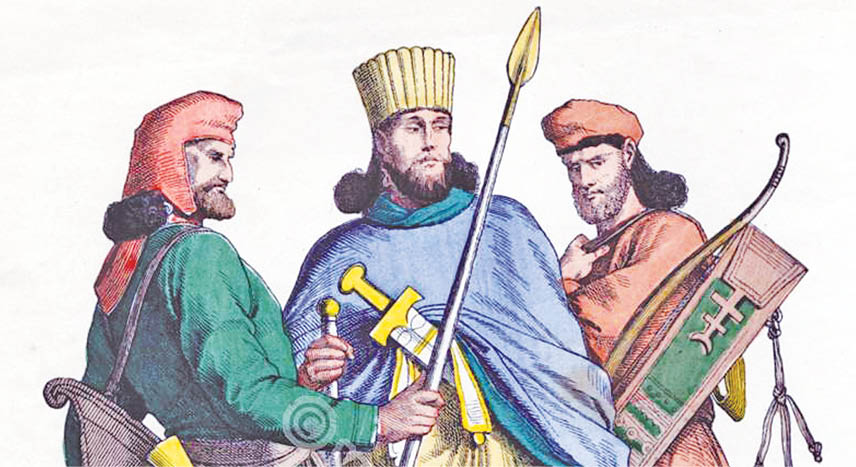Aderbad Bin (son of) Mahrespand was the Mobedan Mobed (Supreme Pontiff) and Prime Minister during the long reign (309-379 A. D.) of Shapur Hormazd also known as Shapur II. According to the Pahlavi Dinkard, from his father’s side, Aderbad Mahrespand belonged to the family of Zarathushtra, and from his mother’s to the family of Shah Vishtasp.
During Shapur’s reign, Christianity was being propagated all over the then known world with missionary zeal. The Roman Emperor Constantine had accepted Christianity and he tried to interfere with the internal affairs of the Iranian Empire under the pretext of protecting interests of the Christians living in Iran. From the common man to members of the Royal family, Christianity began to make inroads and shake the ancient Zarathushtrian faith to the extent that it seemed that soon even Shapur and his nobles would convert them selves to the new faith.
It was at this critical stage in Zarathushtrian history that Aderbad Mahrespand, the Magupalan Magupat (the highest among the Magavs) performed a miracle to prove:
- The power of the Zarathushtrian religion and
- His own religious leadership as the Raenidar of the then new age.
Raenidar is a Pahlavi word meaning ‘spiritual leader’, ‘promoter of the religion’, ‘saviour’.
The Pahlavi Dinkard says Aderbad Mahrespand went through an ordeal where several men poured molten metal over his bare chest. As a result of his piety and spiritual powers, he was able to pass this ordeal without any harm. It is said the molten metal felt like warm milk on this pious Raenidar since he was pure (in thought, word and deed) and truthful.
After this ordeal Aderbad Mahrespand also had court and public debates with leaders of other faiths and intellectually proved the supremacy of the ancient Zarathushtrian faith. By dint of his piety, rectitude, wisdom and learning, Aderbad Mahrespand rejuvenated the religion and established faith among the believers of Ahura Mazda.
Aderbad Mahrespand was a man of great worldly and spiritual wisdom. Very often when bad things happen to good people we begin to question God. Aderbad Mahrespand has advised us to be content in times of adversity and patient in times of disaster. “Do not put your trust in life, but put your trust in good works”, he used to say.
Aderbad Mahrespand used to derive six kinds of comforts when misfortune would befall him:
- that the misfortune was no worse than what it was;
- that the misfortune fell upon his body and not his soul;
- that from his total quota of misfortune there is now one less;
- that the arch fiend Ahriman was desperately making him the target of his attack on account of his goodness and allegiance to Ahura Mazda;
- that Ahriman chose to attack him and not his children;
- And finally he would be thankful that since all the harm that the accursed Ahriman and his demons can do to the creatures of Ohrmazd is limited, any misfortune that befalls him is a loss to Ahriman’s treasury, and he cannot inflict it a second time on some other good person.
Having restored the Zarathushtrian faith among his people, his next task was to consolidate the scattered fragments of the Avesta.
Three centuries before the birth of Christ, Hermippus the Greek had made a reference to two million hymns of Zarathushtra. Much of this was lost when Alexander invaded Iran. In Parthian times, King Valakhsh (Vologases) ordered the collection of the scattered portions of the Avesta. In like manner, during Sassanian times, Ardashir Babagan deputed his High Priest and Prime Minister, Herbad Tansar with the task of compiling the fragments of the Avesta.
Many of the prayers, which we pray from the Khordeh Avesta today, were composed by the pious Aderbad Mahrespand. Amongst others, he is said to have also composed the Patet (prayer of repentance), Afrin (blessings) the Pazand Setayesh (adorations) as also the Pazand Nirang we recite at the end of various Avestan Yashts.
Aderbad Mahrespand was also a store-house of worldly wisdom and some of his sayings are of timeless relevance. Here is a small sample from the Pand nameh:
- “Never speak without due reflection. Be polite in speech; do not tell a lie.
- Man’s greatest and best helper is wisdom – even when wealth and prosperity disappear, wisdom remains.
- Culture is an adornment in prosperity, a protector in distress, a helper in calamity and garment in adversity.
- A man who knows a lot and believes not in its practice is a sinner.
- Do not be overjoyed in good times and over distressed in bad limes.
- Show moderation in eating, drinking and speech.
- Spend only according to your means.”
May Raenidar Aderbad Mahrespand continue to bless us and guide us from the spiritual world and help us all become better and spiritually stronger Zarathushtrians!
- Why Pray In A Language We Do Not Understand? - 29 March2025
- Celebrate Nature’s New Year With Purity And Piety of Ava - 22 March2025
- Celebrate Navruz 2025 With The Spirit Of Excellence And Wholesomeness - 15 March2025
